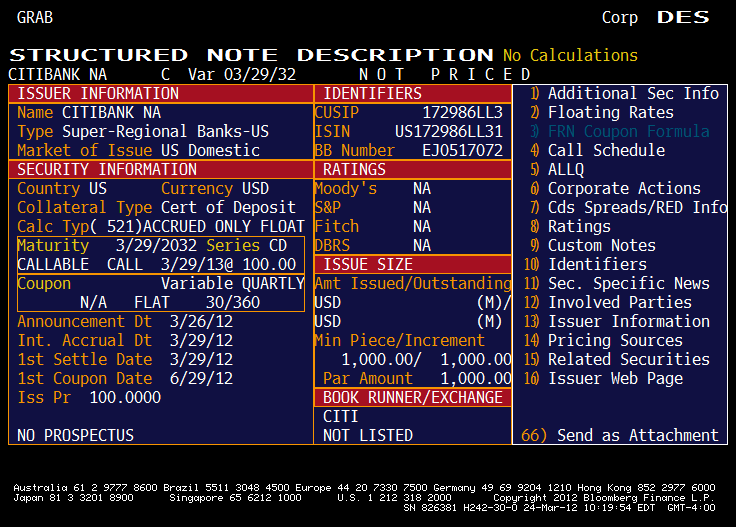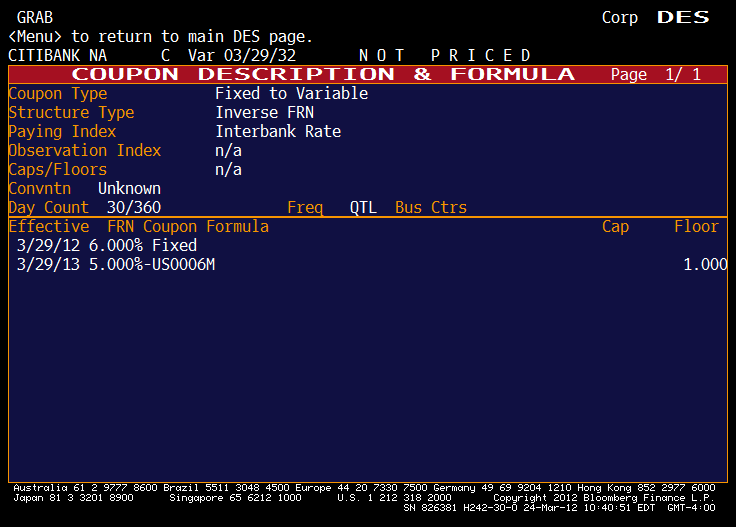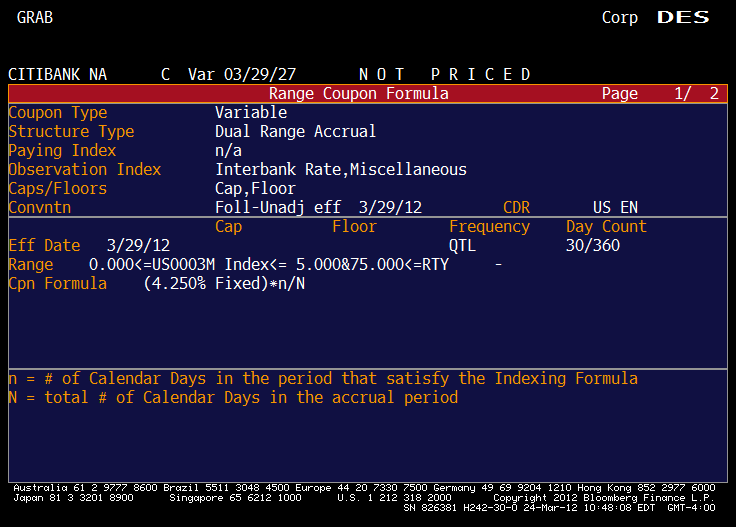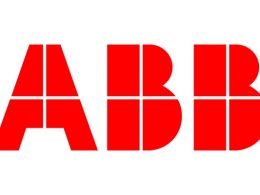by Peter Tchir, TF Market Advisors
Stop tomorrow’s problems today.
Just this week we had:
TVIX – an ETN that provides double the daily change in the vix futures. Who is smart enough to be able to take big bets on VIX futures that doesn’t have a futures account? Who is this designed for?
MF Global & “customer money” – months after the problem, no good explanation of where the money went, and even more scary, is that the it remains unclear whether MF did anything illegal with customer money. Our understanding of how our money should be treated, and the legal rights we have signed away don’t necessarily match up.
CPDO – the legal battle in Australia over this disaster continues. In the top 3 of mis-rated product of all time. You take something that is BBB+ on average, LEVERAGE it, and get AAA. It relied on “self-insurance” the thing partly responsible for the equity crash in 1987.
Greek CDS auction – finally a Credit Event occurred and settled this week. Very few people still seem to understand how lucky CDS holders were that the auction on New bonds delivered a real payout. The system didn’t fall apart as some had worried, but no reason that CDS cannot be at least 90% cleared, or better yet, traded on an exchange.
BATS – “Making Markets Better” according to their website had to pull their own IPO. Maybe they didn’t realize algo’s don’t provide actual liquidity, all they do is take real liquidity from exchange and run around the electronic world trying to scalp a few fractional cents not available to individual investors anyways. If they have to list on a proper exchange, people really should question the need for these other exchanges, sub-penny trading, etc.
I’m all for some complexity and innovation, but it does seem after a week like this, that the financial markets have become too complex, and some real effort should be made to simplify things and put everyone on an even playing field.
Which brings me to a story I’m just getting up to speed on. It seems like banks and investment banks are working on ways to satisfy their customer’s demand for yield. They should come with a warning that “yields in hindsight may be smaller than they appear”. I haven’t been able to confirm that this is being sold to retail or how much has been done, but I decided to poke around in some bonds listed by Citibank – mostly because somehow they seemed to have needed more support from the taxpayers than any other bank (except for BAC which I have picked on too often).
So let’s take a look at what appears to be a Citibank NA Certificate of Deposit – how dangerous could that be?
It seems a bit long for a CD – 2032 final maturity, especially since it is callable at any time. According to this it hasn’t been issued yet, so maybe this is all a bad dream, but since I was able to find it on Bloomberg, it probably is something they are trying to sell.
So on any “fixed income” product, the big question is what is the coupon? It pays 6%!
Ok. I could buy Citigroup Inc 5.85% bonds with a 2034 final maturity. They are non-call and priced around 103.5 to give a yield of 5.57%. So stop right there. The CD may be marginally higher in the capital structure and slightly safer, but for 20 years I would much rather have 5.57% non callable bond rather than a 6% bond callable at any time. I would spend more time working out the value of the call and if the trade-off is even remotely fair, but there is no point, because the coupon isn’t “fixed” it resets annually.
So after 1 year, the coupon will be 5% minus 6 month LIBOR at the time. If today was a “setting” date, the coupon would be only 4.25%. So as short term rates rise in the future, this coupon on this Inverse Floater will go do. If 6 month Libor is ever at 4% or above on a setting date, then this bond will have the “floored” coupon of 1%. So if the Fed starts raising rates or LIBOR goes up because bank credit risk deteriorates, you own a low coupon bond in either a high rate environment, or weak bank credit environment.
But this “Certificate of Deposit” looks tame compared to another they seem to be marketing at the same time. Again, I don’t know for certain that they are marketing this, but it does show up on Bloomberg under a list of Citi bonds, so I have to assume it isn’t there by accident.
So this one is a “dual range accrual”. So it look like you have to track the number of days in a period where 3 month Libor is between 0% and 5% and the Russell 2000 is above 75 (maybe they mean 750?). If both conditions are met for the entire period, you get a 4.25% coupon. So a Citibank CD that is callable at any time, has a best case coupon of 4.25%, and could be 0% in either a high rate environment (libor above 5% or in a weak stock market the RTY is below the threshold). Retail investors are selling options hand over fist with the promise of some decent yield in the first year. I find it hard to believe they understand the options they are selling, and I find it impossible to believe that they are selling the options at anything close to fair value.
Stop tomorrow’s problems today, but if you are show a “fixed income” product where the coupon is too good to be true, it is too good to be true!
Copyright © TF Market Advisors















